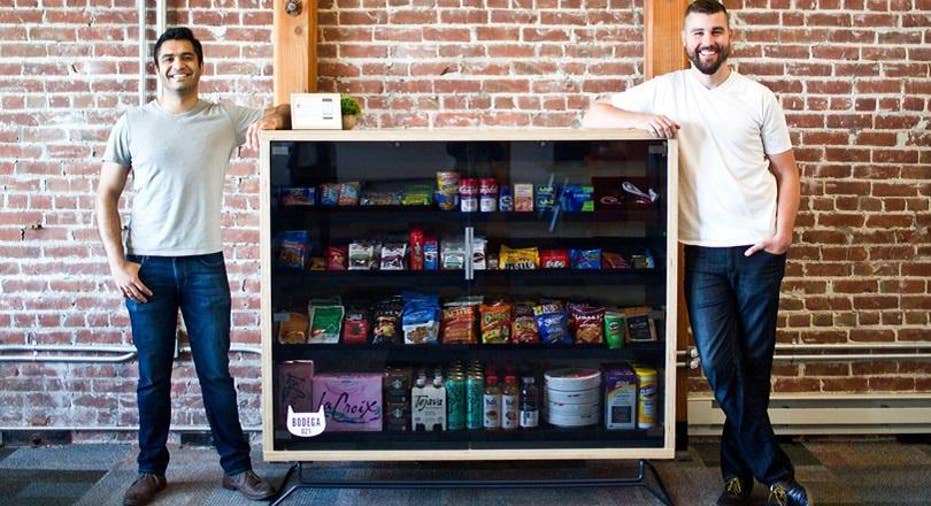'Bodega' Shows Silicon Valley Hates Human Communities

Wealthy young millennials probably don't understand bodegas. Buzzy new startup Bodega, which aims to kill corner stores by replacing them with optimized vending machines, certainly does not. I doubt Bodega will be more than a flash in the pan, but its willful blindness to its potential social effects, once again, shows the worst of Silicon Valley.
Simply put, Silicon Valley disdains cities.
I mean, we knew that already. The funded founders of Silicon Valley tend to be young, childless, rootless transplants, who've poured their time and passion into their business ideas and headed West, like so many others throughout history, to make it rich. Once they get there, they spend their time on campus at Google, Apple, or Facebook, not at the corner store. They hang out with other people like them, in carefully curated contexts that make them believe everyone is like them. And because they're coders and engineers, they love efficient systems.
Cities tend to be messy, with a lot of knock-on effects and ad-hoc aspects. Take the role of bodegas. Here in New York, bodegas are technically grocery stores, but the grocery-store aspect is their least interesting quality. They're fully staffed hubs of urban life. They're the safe spaces you can walk into, at night, when someone's following you on the street. They run cell phone lockers for kids at the high school down the block, which doesn't allow phones. One of them is my local UPS pick-up point. Another one is frequently full of tweens gossiping. They're also one of the remaining ways immigrants lift themselves up, generation by generation, as parents who work in bodegas pay the way for their kids to work in tech.
Bodega the startup, on the other hand, is a hotel honor bar which gets plonked into an apartment building so "centralized shopping locations won't be necessary," founder Paul McDonald told Fast Company. "Bodegas can't compete with this technology, because it is so much more expensive to have a brick-and-mortar store than a small machine," spokesman Frank Garcia told FC.
Silicon Valley has been "disrupting" things it didn't think were clean or efficient enough for awhile, without thought to the broader community effects. Usually, they're "disrupting" things in ways that would appeal to wealthy young millennial consumers and not to the poor, elderly, disabled, or its own employees. Take the Lyft Line shuttle, which cherry-picks public transit routes, in non-wheelchair-accessible vehicles, giving its workers considerably worse pay and benefits than city bus drivers.
They don't have to do things this way. When Citymapper wanted to start a bus service, it actually worked with Transport for London to integrate it into TfL's network, declaring itself to be part of the community, not better than the community.
Bodega's concept could be a good one if the founders and their funders weren't jerks. As this brilliant Twitter thread explains, there are millions of people in the US who live nowhere near walkable retail, who are mobility compromised and could really benefit from a selection of goods in or near their homes. Bodega placed in soulless exurban apartment complexes would hurt only CVS. But instead, these guys target a niche that's already filled.
One of the results of Silicon Valley-driven consolidation is that small businesses get stamped out by behemoths. Amazon killed a thousand bookstores, which paid taxes and had owners. Those owners bought things, invested in things, and sent their kids to college. Uber slaughters taxi companies. Bodega wants to clear-cut bodegas. The problem here isn't creative destruction: it's many being replaced by one, business being consolidated into fewer and fewer hands. Yes, Walmart and other big-box stores started the process, emptying out rural downtowns, but Bodega founder McDonald came from Google, a company that once said "don't be evil."
If economic efficiency is the only goal, and low prices and high profits are the only measure, communities will crumble. As I said, with Walmart and its ilk, they were crumbling already. That's no reason to actively make the problem worse.
I don't fault the bushy-tailed creators of Bodega, not really. They're just individuals with an idea who live in their bubble. I fault the venture capitalists of Silicon Valley who handed them sacks of money, "including Josh Kopelman at First Round Capital, Kirsten Green at Forerunner Ventures, and Hunter Walk at Homebrew," according to FC. We've seen a tight group of private venture capitalists become the funding for our new public services and the structure of our communities, as our politicians sit paralyzed by social division, corruption, and a lack of the desire to invest in even basic services, like buried power lines to protect from storms.
But let's hope that outrage against Bodega, flooding across the internet today, will send its creators back to the drawing board to ask: how can we build up our communities, not shatter them? In a fragile American time, that's what we need. Don't rip out our cities' little hearts for a better venture investment return.
This article originally appeared on PCMag.com.



















